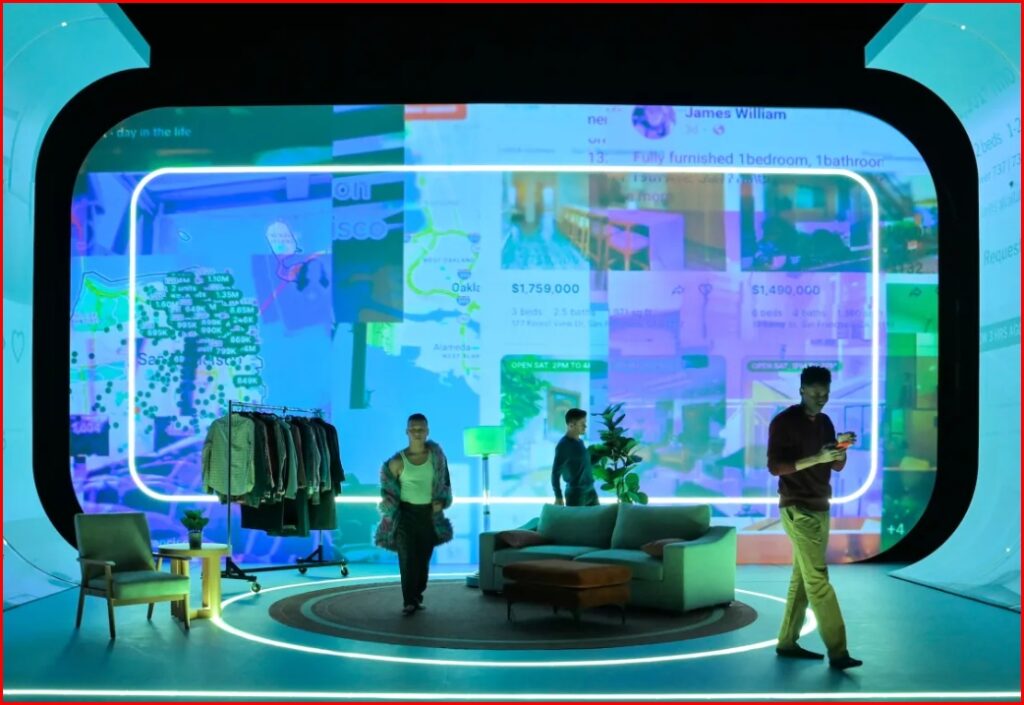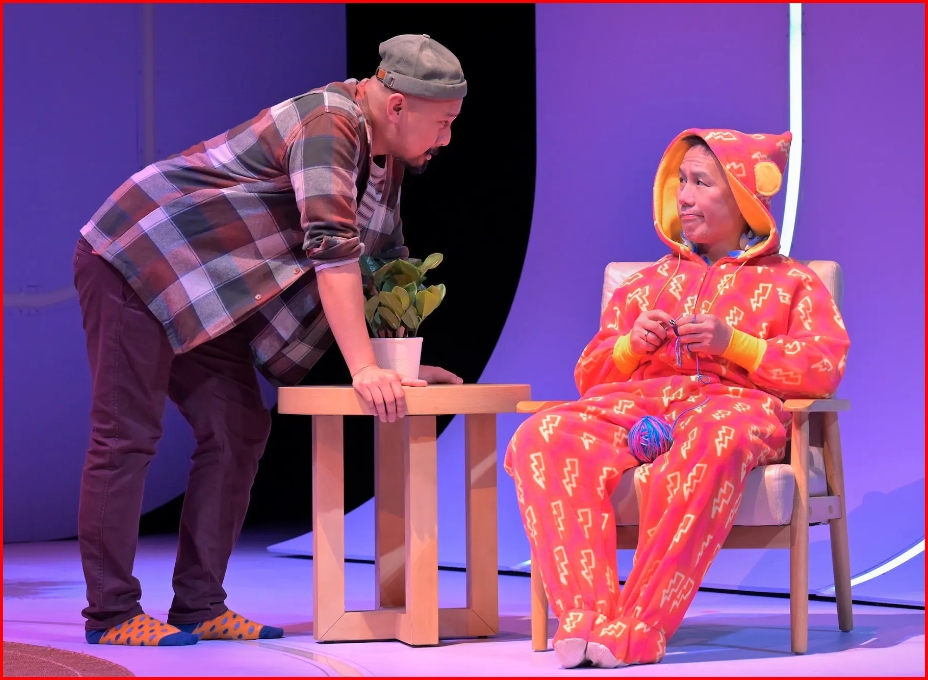By Barry Willis
American Conservatory Theater had the prescience to open Big Data the same week that chipmaker Nvidia’s stock rose by a factor of seven, prompting a market-wide surge. Nvidia makes microprocessors essential to artificial intelligence (AI), the subject of daily news and consternation for at least the past two years.
A world premiere, Big Data launches with an old-fashioned console TV with a big “play” button onscreen, beckoning someone—anyone—to come up from the audience and press it. A long wait ensues until someone can’t stand it any longer and climbs onstage to start the show.
… Big Data launches with an old-fashioned console TV …
We are then treated to a grainy 1950s-style black-and-white film clip about trained pigeons that peck at various levers, piano keys, and other devices to get rewards of food pellets—and an overlong diatribe by a character named “M” (B.D. Wong), a very self-amused expert who equates humans to trained birds. (In the playbill is a “conversation” between playwright Kate Attwell and ChatGPT on this very subject. Somewhat disturbingly, the AI program mentions psychologist B.F. Skinner and his concept of “operant conditioning” but ignores Pavlov and his proverbial dog.)

We get the message within the first thirty seconds. Perhaps to test our patience, this introduction runs for what seems like 15 or 20 minutes, then fades as M visits a depressed writer named Max (Jomar Tagatac). M arrives unbidden at Max’s sparsely furnished apartment. “How did you get in?” Max asks. “You invited me,” M replies.
The meaning of this mysterious statement is elucidated a bit later when M visits quarrelling but very-much-in-love couple Sam and Timmy (Gabriel Brown and Michael Phillis, respectively). During an interminable exchange, one of the pair says, “How do you know my name?” “You told me,” comes the reply.
On a stage whose backdrop is a giant computer screen, with empty living quarters depicted in the stark-white Apple Computer aesthetic, M obviously represents intrusive technology—not merely computers, but all the interactive spinoffs that now seem essential to contemporary life: mobile phones, “smart” TVs, bio-feedback wristwatches that monitor bodily functions and daily caloric expenditures, and presumably even our emotional states. All this is conveyed with aggressive humor and plenty of gratuitous sexual teasing—symbolizing, of course, the seductive lure of life online.
The first act is loud, long, and obnoxious, a sort of survivalist boot camp to see if the audience is willing to hang in there for the second act. We didn’t notice defectors leaving at intermission, but if there were some, their dismay would be somewhat understandable to this reviewer.
The first act of Big Data may be an egregious act of beating the audience over the head, but it’s redeemed by the gorgeously performed second act, which opens on a warm, richly furnished traditional home—all natural wood, with lots of books and art objects (scenic design by Tanya Orellana). This home is inhabited by a very likeable and very comfortable couple in late middle age, Joe and Didi (Harold Surratt and Julia McNeal, respectively) who’ve been puttering in the garden and kitchen in anticipation of hosting a Sunday brunch for their children Sam and Lucy (Rosie Hallett), Max’s wife, and their partners.

The visitors arrive, and the disconnect between the younger generation and their predecessors begins in earnest—first, with Sam asking what happened to the Nest-style thermostat he had given them. Joe responds with self-deprecating humor “I buried it. Under concrete.”—also the fate of their Wi-Fi router, a situation that throws Max into a frenzy. Having abandoned his journalistic career, he’s now engaged in public relations for some high-pressure enterprise, and comes to brunch fretting about being past deadline. He absolutely flips out when he realizes he’s in the countryside with no internet connection. Whatever project of world-shaking importance that he’s working on simply has to wait.
Then Joe and Didi drop the bomb, telling their visitors that they’re withdrawing in protest from the world of interactive technology. Like 19th-century Amish, they’ve decided that further advancement is not for them. This second act unfolds beautifully. Surratt and McNeal are supremely confident and relaxed actors. Their characters’ message—reached after prolonged private discussion—is delivered appallingly to their offspring but convincingly to ACT’s audience.
The second act is almost a one-act play in itself, and well worth sitting through the first. Its impact is weakened by a silly coda in which M reappears and walks among the other six characters frozen in place, making snarky comments as if the preceding drama were of no consequence, as if Joe and Didi’s decisions were pointlessly frivolous. Nothing could be further from the truth.

To its detriment, Big Data hedges its bets. In her playbill notes, director Pam MacKinnon mentions “surveillance capitalism,” a wonderfully apt description of contemporary life. The show’s closing scene would leave viewers with much more to ponder if Joe and Didi were to simply slump to the floor. Fade to black—no cutesy commentary needed.
The audience departing the Toni Rembe Theater perhaps didn’t grasp the enormity of what they had just seen. Many had their phones out before the applause died, and were seen walking up the aisles with faces illuminated. Clearly, the word “irony” is not in fashion.
-30-
 ASR NorCal Executive Editor Barry Willis is a member of the American Theatre Critics Association and president of the SF Bay Area Theatre Critics Circle. Contact him at barry.m.willis@gmail.com
ASR NorCal Executive Editor Barry Willis is a member of the American Theatre Critics Association and president of the SF Bay Area Theatre Critics Circle. Contact him at barry.m.willis@gmail.com
| Production | Big Data |
|---|---|
| Written by | Kate Attwell |
| Directed by | Pam MacKinnon |
| Producing Company | American Conservatory Theater (ACT) |
| Production Dates | Through Mar 10th |
| Production Address | Toni Rembe Theatre, 415 Geary Street, SF, CA |
| Website | www.act-sf.org |
| Telephone | (415) 749-2228 |
| Tickets | $25 – $130 |
| Reviewer Score | Max in each category is 5/5 |
| Overall | 3.5/5 |
| Performance | 4.0/5 |
| Script | 3.0/5 |
| Stagecraft | 3.5/5 |
| Aisle Seat Review PICK? | ----- |

